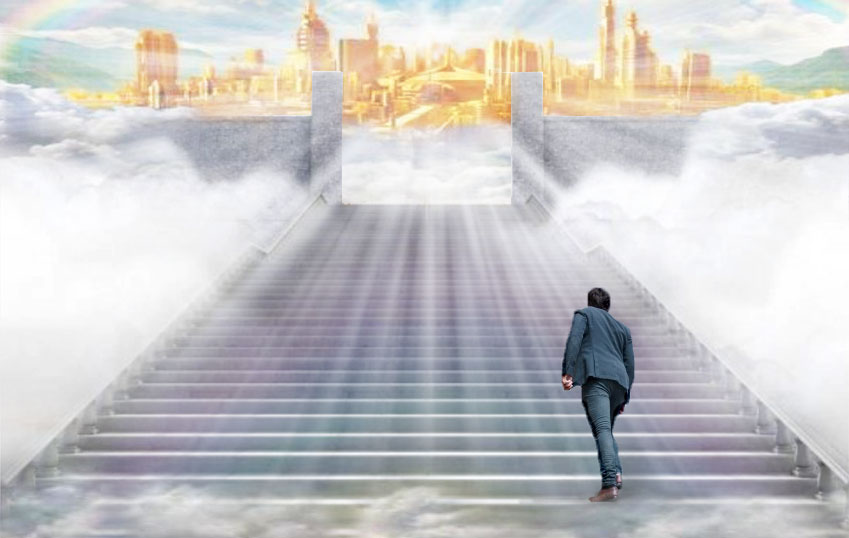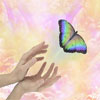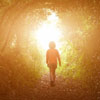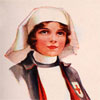Through The Gates Of Death
 by Dion Fortune
by Dion Fortune
The Great Anesthetist
Death is a universal experience. No one can hope to escape. It is only a matter of time till it comes to each one of us and each one of those we love. Yet Death is called the King of Terrors and is the supreme threat of the law to the wrong-doer. What is it that makes a natural process so terrible? Is it the pain of dying? No, for anodynes can deaden that. Most death beds are peaceful when the time comes, and few souls go out struggling. What, then, is it we fear in death that it should be for us a thing of grief and dread?
Firstly, we fear the Unknown.
For in that sleep of death what dreams may come
When we have shuffled off this mortal coil?
Secondly, we dread the separation from those we love. These are the things which make death terrible. How differently should we set out to cross the Threshold were our minds at rest on these two points.
It is recorded that the great gift of the Greek Mysteries to their initiates was release from the fear of death. It is said that no initiate ever fears death. What was it that was taught in those secret rites that robbed death of its terrors?
In the center of the Great Pyramid of Gizeh there is an empty stone coffin. Egyptologists tell us that it was prepared for a Pharaoh who never occupied it. It has also been said that it was a measure for corn. It was neither of these things, but the altar of the Chamber of Initiation. In it lay the candidate while his soul was sent out upon the journey of death and recalled, and this constituted the supreme degree of the Mysteries. After that experience he never feared death again. He knew what it was.
Death, for the man who has this knowledge, is like the embarkation of the rich man upon a liner. He is educated, he knows where he is going, he acquiesces in the journey, realizing its necessity and advantages. His knowledge and resources enable him to travel in comfort and safety. He can keep in touch with his friends at will, and return to them when he desires. For him there is no final and complete severance from his native land.
Far otherwise is it with the poor peasant emigrant. Ignorant and helpless, the journey to him is a dangerous and hazardous undertaking and the land of his sojourn may be filled with wild beasts or undermined with volcanic fires. His ignorant imagination pictures all the terrors he can conceive and applies them to the Unknown.
The ancient Egyptians placed in every coffin a so-called Book of the dead, the ritual of Osiris in the Underworld, which instructed the soul concerning its journey through the kingdoms of the shades. It might more truly be called the Book of the Ever-living, for the soul was conceived of as going through certain stages in that cycle of life which takes place in the Unseen.
It would be well for us were we taught from our earliest years to think of our lives as rising and falling like a boat on the crest of a wave. Now descending into matter through the gates of birth; now reascending to the invisible world through the gates of death, ever and anon to return again and withdraw again in the rhythmical cyclic tide of evolving life.
Uninstructed by the Mysteries, our lives are bounded by the horror of birth and the terror of death. How great is the gift of the guarded wisdom which reveals the road of evolving life stretching before our feet and robs the Unseen of its shadows.
Let us cease to think of Death as the Fury with the abhorred shears and conceive of it as the Great Anesthetist, bidden by the mercy of God to cause a deep sleep to fall upon us while the silver cord is loosed and the soul set free.
From that sleep we awake refreshed, with the problems of earth far behind us, life a young child’s memories of the previous day, and embark upon a fresh phase of our existence. Well is it for us if our friends give us quittance and permit the soul to go free to its own place. Ill is it for us if the grief of those we have left behind shadows that bright morning waking. Just as we feel that we have the right to ask for tendance in our sickness from those who are kin to us, so should we feel that we have the right to ask of them fortitude in their bereavement.
For it is their bereavement, not ours. Whom do we grieve for when we mourn at a funeral? For the Ever-living Dead, in their bright awakening? Or for ourselves in our loneliness? Assuredly we grieve for no one but ourselves, for it is well with the dead; they have gone to their own place and are at peace.
It is those who are left behind who are suffering, not those who have gone before us into Galilee. And what shall we say concerning their suffering? That like all pain, it must be bravely borne, and especially so in this case, for its reverberations may affect others as well as ourselves, and be as a millstone about the neck of the soul that is seeking to rise up on the strong wings of aspiration. Let thoughts of love, not grief, follow that soul upon its journey, as seagulls follow a ship. Let us bid him Godspeed and good cheer, and look forward to the reunion.
For there is much we can do for the departed. Our work is not finished when the coffin is borne from the house and we have put away the sad paraphernalia of illness. If they know more than we do of the ancient, guarded, secret Wisdom, it may well be that they will return to comfort us and give us good counsel. But if we know more than they do, if the soul has gone out in bewilderment and fear, or if it be that of a young child, then it is our bounden duty to follow it out into Unseen as far as lies in our power, until we feel the coming of the Angels (of which more shall be said later), and know that our loved one has passed into their care and all is well.
And there may come to us if we ask, that Angel which giveth the beloved sleep, the deep sleep which is well known to fall upon the watchers of the dead and which is like no other sleep; and from that sleep we too should awaken to the morning calm, for it has been permitted to us to look through the gates ajar and see that beyond the Threshold there is neither terror nor oblivion, but another world, another phase of life.
Out of this sleep which the Angel of Death giveth to the beloved there cometh security and assurance; for we have seen, even if we do not remember. Let us, therefore, when the hour is over, ask of the Great Anesthetist this lesser mercy that we may be tided over the first wrench of the separation and be the better enabled to take up the burden of life and do our duty to those love ones that are left to us, depending upon us and needing us.
And let us, above all things, never forget that in due course the dead will come back, and we never know when we shall see looking out at us from the eyes of little child a soul we have known. Let us therefore, seeking expression for the love that now has no earthly outlet, turn it to the endeavor to make the world a better place for the return of those we love.
This service at least we can do them. That no repining of ours shall make bitter their journey, and that as far as lies in our power, the rough places of the world shall be made smooth against their return.
Crossing The Threshold
When all that medical science can do has been exhausted, those who stand in the death-chamber awaiting the end are filled with an overwhelming sense of impotence; they have the desire to help, but the total inability to find any adequate practical expression thereof. The consolations of religion may comfort those to whom the spiritual life is a reality, but for many it is no more than a vague hope, and for some, a negation. Have we anything to offer to these?
Yes, we have. We can offer them knowledge. Knowledge derived from the experience of many, many souls who have crossed the great gulf and returned to tell us of their adventures; and also from the experiences of those others, fewer, perhaps, but for us more convincing, who can remember their past lives. In Europe they are rarely to be met with among adults, but many children, before the shades of the prison house of world things close about them, can give us memories of past lives if we ask wisely. In the East such memories are common, being the rule rather than the exception.
This knowledge concerning the hidden life of the soul cannot only give courage and comfort to the doubting, but be the means of actively helping those who are passing over. We need no longer stand with empty hands at the bedside of the dying. Though our hands may find nothing more to do, our minds should be active, and we should be making ourselves ready to accompany our friends on the first stage of their journey. We can literally “set them on their way” as we would do with the parting guest.
But before we can consider exactly what may be done for the departing, we must first understand the process of the putting off of the flesh.
There are two kinds of death, natural death and violent death; and there are also two kinds of passing, the peaceful passing, which is normal, and the unpeaceful one, which is pathological for dying is no less a natural process than being born, and has its norm and its pathologies.
Natural death is that which takes place gradually, the soul loosening itself from the body before its departure just as a child’s milk teeth become loose in the socket and fall out painlessly. Violent death, however, is like the pulling of a tooth by the dentist. There is a wrench, a shock, and some bleeding and soreness. Normally, however, the Great Anesthetist gets in his work rapidly, and with the first opening of the line of cleavage between soul and body, the Grater Sleep descends upon us and we know no more [until we awake again]. Where, however, there is much fear of death, or a desperate clinging to life, the work of the Great Anesthetist is frustrated, and then are seen those terrible death beds when the soul goes out struggling.
This should never take place, and need never take place where there is adequate knowledge of the processes of death and the after-death life. The dying man should surrender himself into the hands of the Merciful Angel with the same confidence and gratitude that he would submit to the offices of the physician who is given the anesthetic that is going to shield his consciousness from the work of the surgeon. As soon as the ether gets in its merciful work, the pain and fear will fade and he will sleep for awhile, knowing nothing. And so it is with death, the Dark Angel closes one by one the avenues of consciousness, and we sleep within ourselves while the processes of the separation of body and soul go on. When all is over, then we are freed from the body, the Angel will reopen the gates of awareness upon a higher plane, and we shall live again, though in another dimension. We may find it difficult to realize the kind of life to which we shall open our eyes as the day dawns once more, but we may rest assured that when we awaken on the next life, it will appear to us as normal and natural as the Earth life to which we are accustomed because we shall find that we are adapted to it.
The soul that goes to meet death with understanding, invoking the merciful offices of the Grey Angel and welcoming his healing ministrations, will draw out from the bourne of time and space as quietly and steadily as a great ship putting to sea. The changes come gradually, there is no shock or surprise, and as one shore fades, the further one begins to rise above the sky line.
Insensibly we have drawn away from the body without noticing it. The lower consciousness is now deeply anesthetized. The higher consciousness is opening, and we find ourselves in what has been called by various names, but which we will call the Body of Light. This is not the same thing as the Etheric Double, or subtle, magnetic, aspect of the physical body. It is this which is anesthetized by the Grey Angel, for it is in this that the physical processes of death go on; but we know nothing about them, any more than we know of the operation that is performed upon us while we are under chloroform.
It is not everyone, however, who falls into a deep sleep when passing through the Gates of Death. Souls with any degree of psychic development pass out in full consciousness. For although the physical body lapses into insensibility, we should not take it for granted that the soul is unconscious. Anyone who has had experience of trance knows that this is not necessarily so, and that consciousness can be transferred from the body to the soul and retained unimpaired. It is this which happens in death. The consciousness is transferred from the body to the soul, and the soul departs to its own place on the Inner Planes, taking the consciousness with it.
It may be wondered whether the soul will not be lonely and forlorn when it first arrives in the Heaven-world, but all who have returned to tell us about the pathway of death, and they are very many, agree that this is not the case. The Heaven-world appears familiar to the newcomer, and for this reason, we are all accustomed to go there in sleep every night!
There is a sleep-life of the soul of which the average person is unaware because he does not bring back the memory upon waking. It is beyond the realm of dream, which is purely subconscious, and the soul of little psychic development remains sound asleep while out of the body, or at best, drowsy and difficult to rouse. It is the rousing of the soul to consciousness upon this plane which produces the dreams which are not like ordinary dreams, of which many people have had experience.
The psychically developed person is at a great advantage when it comes to passing through the Gates of Death, for he goes over in full consciousness. He does not sleep the sleep of death, he merely loses consciousness of the physical plane while retaining all his faculties. Anyone who has ever experienced trance with retained memory, or a lucid dream, has died and risen again, and he will find that death is exactly the same.
But although the Heaven-world will not prove to be unfamiliar to us, seeming rather like the home of early childhood revisited, we are nevertheless not left comfortless. There is organized charity in the next world just as there is here, and there are disembodied souls who give themselves to the work of receiving and ministering to the newcomers, companioning them until they feel at home.
It is well known how often dying people exclaim that they see a great light, and in that light are the faces of friends and relatives who have passed out before them. Whenever there is a strong bond of love between souls on different sides of the gulf of death, those on the far side invariably come down to the shore to welcome the newcomer upon his arrival.
It is a great thing to know that as the physical world recedes from us, the coast of the next world is rising above the horizon of consciousness, and on that shore will be awaiting our coming all those who have loved us and who have gone before us into the Unseen. We shall land amid familiar faces, as the last words of many a passing soul, calling a greeting, give evidence.
But what of those who have no close ties with any in the next world. Are they left comfortless? No, indeed. They will be met by those who knew unrequited love while on earth, and who have given to the service of all the love which was not needed by the one. They come to meet the friendless ones those who have in their own lives achieved the ideals, however dimly realized and rarely glimpsed, which appealed to each soul as the noblest goal of life; and by their help the soul goes forward to its lessons and its achievements.
Excerpt from Through The Gates Of Death
Part II coming soon.
Posted in Life After Death, Life On The Other Side, Other Topicswith comments disabled.





